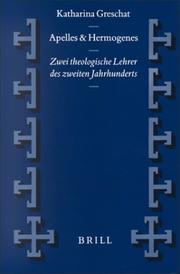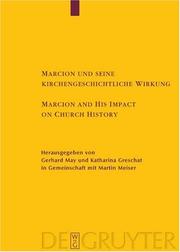| Listing 1 - 10 of 17 | << page >> |
Sort by
|

ISSN: 0920623X ISBN: 9004115498 9004313141 9789004115491 9789004313149 Year: 2000 Volume: 48 Publisher: Leiden Brill
Abstract | Keywords | Export | Availability | Bookmark
 Loading...
Loading...Choose an application
- Reference Manager
- EndNote
- RefWorks (Direct export to RefWorks)
This volume deals with the intellectual and social context of two Christian teachers living in the second half of the second century. It presents a coherent reconstruction and interpretation of their teaching, often considered to be marginal within the development of early Christian doctrine. The first part of the book seeks to understand the Marcionite Apelles as a cultured person, who shaped his understanding of Christian doctrine in the context of the philosophical background and in permanent discussion with other Christian schools. In this respect Apelles coincides with the Christian Platonist Hermogenes. His opinions are described in the second part of the book. The author points out that teachers like Apelles and Hermogenes had to answer the questions of the educated in order to defend and to define their understanding of Christian faith.
Theology --- History --- -Christian theology --- Theology, Christian --- Christianity --- Religion --- -Apelles --- Hermogenes the heretic --- Apelle --- -History --- Apelles, --- Hermogenes, --- Hermogène, --- Early church. --- 30 - 600 --- Early Church Period --- Primitive and Early Church Period --- Theology - History - Early church, ca. 30-600.
Book
ISSN: 21908141 ISBN: 9783777215143 3777215147 Year: 2015 Volume: 6 Publisher: Stuttgart Hiersemann
Abstract | Keywords | Export | Availability | Bookmark
 Loading...
Loading...Choose an application
- Reference Manager
- EndNote
- RefWorks (Direct export to RefWorks)
Dieses Buch der Bochumer Kirchenhistorikerin Katharina Greschat nimmt die Leser mit auf eine ganz besondere Reise durch das Römische Reich vom zweiten bis zum sechsten Jahrhundert n. Chr. Sie bieten die Gelegenheit, zwölf gelehrte christliche Frauen zu treffen : von der Märtyrerin Perpetua aus Karthago über die Pilgerin Egeria, die jede heilige Stätte anschauen musste, bis hin zu den hochgelehrten Dichterinnen Proba aus Rom und der Kaiserin Eudokia aus Konstantinopel. Neben den anschaulichen Porträts geht es immer auch um die Frage, wie weibliche Bildung in unterschiedlichen historischen, sozialen und theologischen Zusammenhängen ausgesehen hat.
396.7 --- Vrouw en religie --- 396.7 Vrouw en religie --- Women --- Women in Christianity --- Women and religion --- Education, Medieval --- History --- Women - Education, Medieval --- Women in Christianity - History - Early church, ca. 30-600 --- Women - History - To 500 --- Thecla v. m. Seleuciae in Isauria --- Perpetua et Felicitas mm. --- Egeria peregrina --- Syncletica v. Alexandriae --- Macrina soror S. Basilii et Gregorii Nysseni --- Olympias diaconissa CP --- Paula vidua Romana --- Marcella vidua Romae --- Melania iunior, matrona Romana --- Eudocie-Athénaïs (Aelia Eudocia), femme de Théodose II
Book
ISBN: 3161486188 Year: 2005 Publisher: Tübingen Mohr
Abstract | Keywords | Export | Availability | Bookmark
 Loading...
Loading...Choose an application
- Reference Manager
- EndNote
- RefWorks (Direct export to RefWorks)
Church --- History of doctrines --- Gregory --- Bible. --- Criticism, interpretation, etc. --- History
Book
ISBN: 3865391052 9783865391056 Year: 2006 Publisher: Wiesbaden: Marix,
Abstract | Keywords | Export | Availability | Bookmark
 Loading...
Loading...Choose an application
- Reference Manager
- EndNote
- RefWorks (Direct export to RefWorks)
Book
ISBN: 9783777217017 3777217018 Year: 2017 Publisher: Stuttgart : Hiersemann,
Abstract | Keywords | Export | Availability | Bookmark
 Loading...
Loading...Choose an application
- Reference Manager
- EndNote
- RefWorks (Direct export to RefWorks)

ISBN: 3110175991 3110905590 9783110175998 Year: 2002 Volume: 150 Publisher: Berlin de Gruyter
Abstract | Keywords | Export | Availability | Bookmark
 Loading...
Loading...Choose an application
- Reference Manager
- EndNote
- RefWorks (Direct export to RefWorks)
Der Band versammelt neue Forschungsbeiträge zu Marcion, dem bedeutendsten Ketzer der christlichen Antike, und setzt sich dabei insbesondere mit Adolf von Harnacks epochaler Marcioninterpretation auseinander. Harnacks Bild von Marcion als eines biblizistischen Theologen und treuen Paulusschülers, der den theologischen Entwicklungen des 2. Jahrhunderts fremd gegenübersteht, hat sich als historisch fragwürdige Modernisierung erwiesen. Die einzelnen Beiträge des Bandes ordnen Marcion und die marcionitische Kirche wieder in ihren historischen Kontext ein. Erstmals werden auch die theologiegeschichtlichen Hintergründe der Marciondeutung Harnacks und ihre Rezeption im 20. Jahrhundert gründlicher beleuchtet. The volume presents a collection of new research findings on Marcion, the most important heretic in Classical times, and in particular takes issue with Adolf von Harnack's epoch-making interpretation of Marcion. Harnack's view of Marcion as a biblical theologian and faithful pupil of Paul's, who was alienated by the theological developments of the 2nd century, has proved to be a historically questionable modernisation. The papers in this volume place Marcion and the Marcionite Church back in their historical context. For the first time, the papers also reveal more thoroughly the theological historical background to Harnack's interpretation of Marcion and its reception in the 20th century.
Theology --- History --- 276 =75 MARCION --- 273.1 --- Griekse patrologie--MARCION --- Gnosis. Gnosticisme --- 273.1 Gnosis. Gnosticisme --- Marcion, --- Markion, --- מרקיון --- Marcion of Sinope --- Influence --- Congresses --- Christian heresies --- Primitive and early church, ca. 30-600 A.D. --- Kirchengeschichte. --- Kongress. --- Mainz ‹2001›. --- Marcion ‹Sinopensis›. --- Rezeption. --- RELIGION / Christian Theology / Ecclesiology. --- Theology - History - Early church, ca 30-600 - Congresses
Book
ISBN: 3805335938 9783805335935 Year: 2005 Volume: 68 Publisher: Mainz Von Zabern
Abstract | Keywords | Export | Availability | Bookmark
 Loading...
Loading...Choose an application
- Reference Manager
- EndNote
- RefWorks (Direct export to RefWorks)
Theology --- Gnosticism. --- History --- Christian heretics --- 276 =75 MARCION --- 276 =75 MARCION Griekse patrologie--MARCION --- 276 =75 MARCION Patrologie grecque--MARCION --- Griekse patrologie--MARCION --- Patrologie grecque--MARCION --- Heresies and heretics --- Heretics, Christian --- Heretics --- Marcion, --- Markion, --- מרקיון --- Gnosticism --- Cults --- Theology - History - Early church, ca. 30-600.
Book
ISBN: 3865391672 9783865391674 Year: 2009 Publisher: Wiesbaden: Marix,
Abstract | Keywords | Export | Availability | Bookmark
 Loading...
Loading...Choose an application
- Reference Manager
- EndNote
- RefWorks (Direct export to RefWorks)
Paulus Thebaeus --- Hilarion ab. in Palaestina --- Malchus mon. captivus
Book
ISBN: 3839455472 Year: 2021 Publisher: Bielefeld transcript Verlag
Abstract | Keywords | Export | Availability | Bookmark
 Loading...
Loading...Choose an application
- Reference Manager
- EndNote
- RefWorks (Direct export to RefWorks)
Schmerz scheint kein Thema zu sein. Selbst in Zeiten von Covid-19 wird kaum darüber gesprochen. Und auch in theologischen Kontexten beschäftigt man sich erstaunlich wenig damit. Das könnte daran liegen, dass sich das Empfinden körperlicher Schmerzen mit sprachlichen Mitteln nur unzureichend zum Ausdruck bringen lässt. Gleichwohl haben theologische Deutungen von Schmerz den kulturellen Umgang mit ihm entscheidend mitgeprägt - von der Aufforderung zum Mitleiden über das »mannhafte« Ignorieren des Schmerzes bis zu den unterschiedlichen Bemühungen, Schmerzen zu lindern und seine Ursachen zu heilen.


ISBN: 9783110905595 9783110175998 Year: 2013 Publisher: Berlin ;; Boston De Gruyter
Abstract | Keywords | Export | Availability | Bookmark
 Loading...
Loading...Choose an application
- Reference Manager
- EndNote
- RefWorks (Direct export to RefWorks)
| Listing 1 - 10 of 17 | << page >> |
Sort by
|

 Search
Search Feedback
Feedback About UniCat
About UniCat  Help
Help News
News